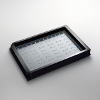Open Access
Micromachines 2021, 12(5), 550
Evaluation of the Effects of Solvents Used in the Fabrication of Microfluidic Devices on Cell Cultures
Xiaopeng Wen 1, Seiichiro Takahashi 2, Kenji Hatakeyama2 and Ken-ichiro Kamei 1,3,4
1Institute for Integrated Cell-Material Sciences (WPI-iCeMS), Kyoto University, Yoshida-Ushinomiya-cho, Sakyo-ku, Kyoto 606-8501, Japan
2Incubation Center Organs On Chip Project, Ushio INC, 1-6-5 Marunouchi, Chiyoda-ku, Tokyo 100-8150, Japan
3Wuya College of Innovation, Shenyang Pharmaceutical University, Liaoning 110016, China
4Department of Pharmaceutics, Shenyang Pharmaceutical University, Liaoning 110016, China
Cell culture systems using microfluidic microphysiological systems (MPS) are expected to be a promising alternative to animal experiments. In this study, photobonded and organic solvent-bonded MPSs were fabricated and their effects on cell culture were investigated.
It was confirmed that photojunctional MPS had better coating efficiency for extracellular matrix proteins (e.g., collagen I) than solvent-bound MPS, and also showed less cytotoxicity against SH-SY5Y neuroblastoma cells. Thus, the study of the influence of the materials used in the fabrication of MPS is an essential step before MPS can be applied to drug screening and toxicology.
For papers (You are leaving for an external site.)
Copyright © USHIO INC. All Rights Reserved.

